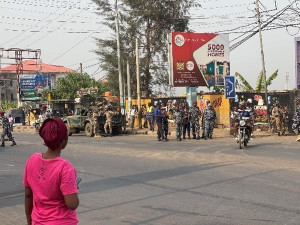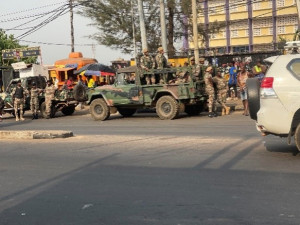By Foday Moriba Conteh
The recent enforcement of restrictions on the Public Transport Corridors by the Government of Sierra Leone has ignited discontent among residents in affected areas, who now grapple with challenges in their daily transportation needs. The ban, which bars the use of push carts, Okadas, Kekehs, heavy goods vehicles, and public transport vehicles (except for SLPTA licensed operators) between 6 am to 10 pm, has garnered criticisms from various sectors of society. Notably, Okada and Kekeh riders have voiced dissatisfaction with the decision, citing adverse effects on their livelihoods. This is also the case with Poda Poda drivers plying East End corridor.
Tensions escalated on early hours of Tuesday, February 6th, 2024, as reports emerged of Okada Riders barricading certain areas along Wilkinson Road, hindering other vehicles, including Government buses, from using the road. Allegations surfaced that these riders threatened to burn down the Government buses. In response, Police and Military personnel were deployed to several locations, resulting in clashes with Okada riders and causing discomfort among residents while leaving many stranded without transportation.
This incident underscores broader governance and decision-making issues in Sierra Leone. While the Government has the authority to enforce regulations, it must also consider the broader implications of its actions and address grievances through dialogue and inclusive decision-making. Past violent incidents, such as the Tombo Saga and August 10th events, underscore the potential consequences of unilateral decisions without proper consultation and consideration of citizens’ concerns.
In light of these developments, stakeholders are urging the Government to reconsider its approach and engage in constructive dialogue with affected sectors. Proactive measures, including consulting stakeholders, conducting impact assessments, and exploring alternative solutions, are needed to address the root causes of discontent and accommodate the needs of all parties involved.
Furthermore, the Government must recognize the potential for further escalation of tensions if grievances are not promptly addressed. History has shown that unresolved disputes can quickly spiral into violence, with devastating consequences for communities and the nation as a whole. Therefore, prioritizing conflict prevention and resolution should be a paramount concern for policymakers.


In conclusion, while the Government has a duty to enforce regulations in the interest of public safety, it must also prioritize the well-being of its citizens and address their concerns effectively. By engaging with affected sectors and finding mutually beneficial solutions, the Government can prevent further escalation of tensions and ensure peace and stability in the country. The events that unfolded on the early hours of Tuesday, February 6th, 2024, along Wilkinson Road between Okada Riders and Security Forces are deeply concerning for our nation. This medium has in its possession videos of security personnel allegedly beating Okada Riders and Pillions. However, due to ethical reasons, we cannot share these videos on social media. Such actions have the potential to fuel violence in the country.
It is imperative for the Government to adopt proactive measures to prevent conflicts rather than merely responding to them reactively. Open communication channels and active involvement of stakeholders in decision-making processes are crucial to mitigating the risk of further escalation and promoting peaceful resolution of grievances. Failure to do so risks exacerbating existing tensions and potentially leading to further violence in the country.




